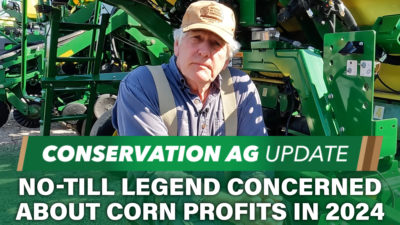Should crop insurance be linked to soil health? Two scientists at Cornell University believe that if we want to see soil health improve, the answer is “yes.”
A recent Civil Eats article says Joshua Woodard, an agricultural and consumer economist, and post-doc research assistant Leslie Verteramo Chiu, looked at what might happen if crop insurance were tied to soil quality, and determined that including soil data in crop insurance criteria would “open the door to improving conservation outcomes.”
Right now the U.S. Federal Crop Insurance Policy (FCIP), which Woodard and Chiu say is the largest program in the world — with around $100 billion in coverage annually — bases its premiums on production, without factoring in the health and quality of the soil. According to the website cropinsuranceinamerica.org, the only conservation compliance requirement for crop insurance is adhering to “an approved conservation plan intended to protect highly erodible lands and wetlands in order to be eligible for a premium discount.”
In fact, many no-tillers would probably agree that the current program discourages growers from trying to improve soil health. Over the years we’ve written extensively about the dilemmas cover crop users have faced with their crop insurance — and it’s the only agronomic practice that impacts a farmer’s eligibility for crop insurance, says Ryan Stockwell, senior agriculture program manager for the National Wildlife Federation.
Ohio no-tiller and veteran cover crop user David Brant was even quoted in a Mother Jones article that he doesn’t carry crop insurance, because it “compels farmers not to make good management decisions.”
Bruce Knight, former chief of the NRCS and a South Dakota farmer, told Civil Eats that “as a farmer, I have always resented that the price my neighbors — who don’t do a good job with conservation — pay is the same as what someone who does practice conservation.”
I don’t blame him and I’m guessing you don’t either. Given the fact that a healthier soil often produces healthier, higher-yielding crops that are more resilient to severe weather, it doesn’t make sense that someone taking care of their soil should pay as much as someone who neglects it. And it really doesn’t add up that someone trying to improve their soil through cover crops may get penalized for it.
With crop insurance looking to take a hit under President Trump’s budget proposal, we’ll see whether any changes occur with the next farm bill. But as the Civil Eats article concluded, “Woodard’s paper lays the groundwork to show that if and when the USDA is ready to make a move, soil quality data could play a key role in transforming crop insurance for the better.”






